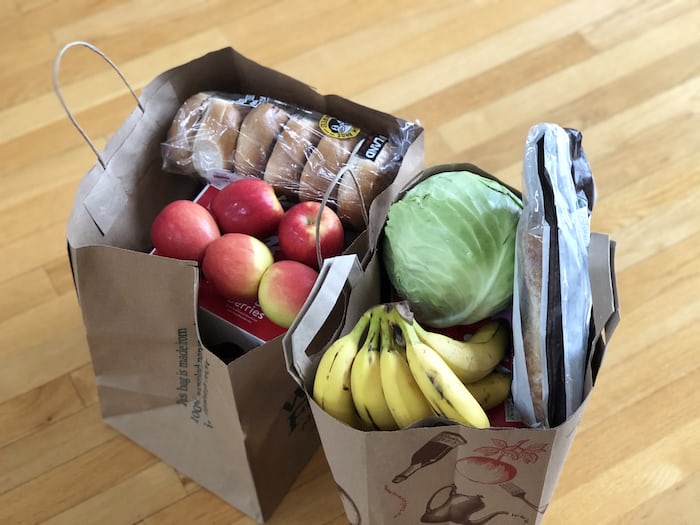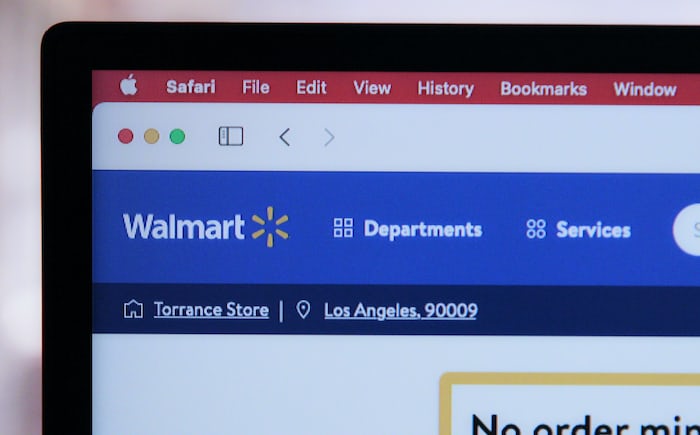Last updated Mar. 14, 2023 by Charles Zemub
Traveling can be expensive, especially when trying to keep your con. To help save money on your next trip, we’ve compiled a list of fifteen cheap alternatives to hotels.
Stay in a Home
Look for a home with a kitchen. If you can cook, this can save money on eating out and bag groceries.
Look for a home with a washing machine. You don’t want to be doing laundry while traveling or staying elsewhere. It’s just one more thing to deal with when you’re busy.
Look for a home with a dryer. You won’t have to worry about hanging your clothes outside or hoping they’ll dry quickly until it rains again (which, let’s face it, happens). But if the weather is nice, hanging some items out to dry in fresh air may be excellent.
Look for a home with an outdoor fireplace if possible! Nothing makes winter better than sitting by the fire while drinking hot cocoa and reading books under blankets while snow falls outside.
Or maybe just watching Netflix would do the trick too? Either way, it sounds incredible, so go ahead, d and book fantastic ow before all these hooked up too fast! And don’t forget: there’s no better place than home.”
Locate the Best Hostel for You
When looking for a hostel, it’s important to consider what type you’re looking for; For example, many people prefer hostels because they are a great way to meet other travelers.
If you’re traveling solo or with someone else and want to meet people, this is something.
However, if you have children or multiple people in your group who need their own space, it may not be the best o for everyone at your party.
As with any accommodation when staying somewhere new, safety should always be at the forefront of everyone’s mind.
Hostels usually offer lockers where guests can store valuables safely overnight so that no one has access unless they have paid for entry the day before check-(or whenever).
Look for Bed & Breakfasts
Bed and breakfasts are a great option for travelers and an excellent to save money but still enjoy the convenience of a hotel.
Bed and breakfasts are often cheaper than hotels. In some places, you may be able to get breakfast for less than you would pay for a cheap hotel room.
Bed and breakfasts provide an intimate experience. However, since these properties usually only accommodate fewer guests at one time, you can expect more personalized service from your hosts or hostesses.
Bed and breakfasts often offer amenities that you won’t find in other you won’t find in other fast Wi-Fi, access, cable TV, and other extras that may be, lacking at some budget hotels.
Book a Room in a Person’s Home
When you’re looking to save some extra bucks while traveling, it’s time to consider booking a room in someone’s home.
The good news is that there are plenty of hosts out there in their homes, and they give you an affordable place to stay.
The bad news? You’ll have to be more selective about which hosts (or “hosts”) you choose. Some are more selective than others, so make sure the person who owns the place wants to meet you before booking anything.
You can find these people on websites like Airbnb and Couchsurfing but if those aren’t working for you, try Home Stay (which allows both residents and travelers).
Searching around may take some time before finding someone willing enough to help you find an affordable room and friendly enough to welcome guests into their homes.
Rent an RV
Rent an RV. RVs are a great way to explore the countryside. You can rent them every day or week, but they’re not cheap. You’ll need to pay for gas, insurance, and a driver.
There are many ditherers available for rent: motor homes with mattresses that fold out into beds; fifth wheels (which have no separate cabins); pop-up campers; and towable with everything you need right in them (including bathrooms).
Suppose you’re going to be taking long trips across the country. In that case, renting an RV might be your best option because it’s more comfortable than sleeping in a tent while traveling cross-country or driving from one place to another at night when hotels aren’t available.
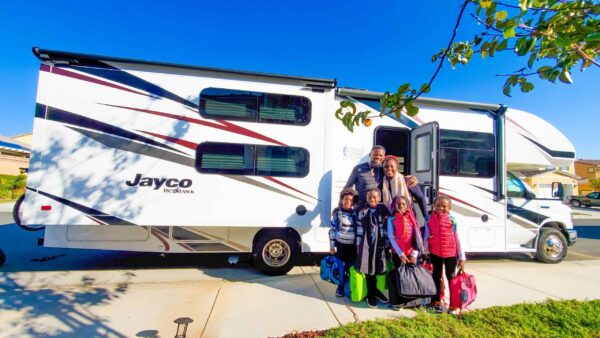
Pick up a Houseboat Option
There are a lot of reasons why houseboats are better than hotels. First, they’re more affordable—a houseboat can cost as little as $100 per night in some places, a fraction of what you’d pay at even the cheapest hotel.
Second, they’re more comfortable than most hotels. Most houseboats have kitchens and living rooms, so guests can prepare meals, relax, and watch TV if they want to; this often means you’ll save money on restaurant meals too.
Thirdly, houseboats offer privacy that is hard to find in hotels. In addition to being alone for most of the time (most people who stay at hotels aren’t lucky enough to have their private room), there’s a nod for chaperones when visiting nearby cities or museums because it’s all happening within your floating abode.
Finally, there isn’t much more about this topic except that everyone should try renting one someday because it’s awesomely unique (and eco-friendly).

Instead of renting your own home, try house-sitting.
What is house-sitting? It’s when you stay in someone else’s home while they’re away on vacation or a business trip. You can do a ton on this for free (or at least free room and board), which saves you money while still getting to see new places and meet new people.
How do I get started with house-sitting? First, search on sites like Trusted House sitters, Mind My House, and House Cares to see if any opportunities in your area interest you.
Then sign up for the sites by providing information about yourself, including contact info, past references, previous house-sits completed, etc.).
Next, please create a profile page with pictures so homeowners can see who they’re dealing with before agreeing to have someone live on their property.
Finally, please fill out all documents, such as insurance papers, because many homeowners will require them before letting anyone stay at their residence.
Pick up a room swap.
A room swap is a great way to save money on your next vacation.
How it works: People post their dates and destinations on a community page, and then you can browse through the listings if you find someone who has the same goal with the same destination.
This could be one person staying in a hotel, another getting their place, or two splitting the cost of renting an apartment together and saving money on both ends.
How to find one: One good site is Room swaps (which charges $1 per listing). Another option is VRBO; many people use this service for booking travel accommodations, so why not try using it for swapping too?
You’ll have more success if you are flexible about where and when you go—for example, if anyone wants to swap with me for Tokyo in March 2020 instead of June 2021, that’s fine too.
And don’t forget about Couchsurfing. It may not always have space available, but if nothing else is available, then there’s no harm in contacting hosts directly through their profiles on the site rather than waiting until something opens up elsewhere first.

Try your luck with online travel communities and groups.
For a more social experience, try your luck with online travel communities and groups.
Facebook groups are a great place to find fellow travelers. You can join active groups such as “Traveling with Kids” or “Digital Nomads” (these are both closed groups) and start asking questions about where people are going or have been.
It may be that someone has just visited the same city you want to visit! If you make it known see our goal is to save money, people might offer advice on how they found cheap flights or hotels, for example.
Twitter also has some great travel accounts you can get outstanding ow for inspiration: @nomadicmatt shares his adventures around the world; @travelwithshannon is based in New York City and loves hiking; @roamingwithkids posts beautiful photos from her travels around Europe with her two kids; and @saraberenger offers tips on making the most out of domestic flights in Canada.
Connect with discount websites and apps.
One of the best ways to save money when traveling is to find deals on hotels, flights, and cars. The internet is teeming with discount websites and apps that can save you up to 50% or more on your trip.
But be sure not to go overboard—there’s no point in saving $30 if it means spending hours searching for the best deal.
- Get a subscription service.
If you’re going somewhere frequently or regularly (for example: if you’re driving cross-country, think a subscription service for your vehicles’ maintenance needs cars having them done at gas stations or other shops along the way.
This way, instead of paying $20-$40 every time something breaks down (which happens more often than we’d like), you’ll only pay one fee per month, and it will usually be cheaper than getting repairs done at random places the road.
Consider the idea of short-term apartment rentals and houses.
Don’t have a permanent address? Consider renting a room in someone’s home for a short period. Sites like Air period way are great places to start your search, or you can try Gumtree or Craigslist.
You can also rent an entire home for a longer period, which extends you, saving cost more upfront. Sites like VRBO offer this option, as do Bed & Breakfasts across the country.

Enjoy nature by opting for a campground or national park.
Camping is excellent for those who want to save money, enjoy nature and spend time with friends and family.
First, camping allows you to experience a different environment than you are used to. You course yourself in the habitat of various animals or plants other learn about their habits and ways of life. You also get a sense of accomplishment to feel what accomplished has to offer.
Secondly, camping saves you money on accommodations without sacrificing comfort or safety because your tent will provide shelter from the elements while still giving you a good night’s sleep under the stars.
Plus, other activities like hiking and swimming are free (as long as they aren’t within private property).
Thirdly, there are many campsites available at national parks where entrance fees are waived for campers if they choose not to stay in an RV. Still, pitch tents to instead, making them even cheaper options than hostels when traveling abroad.”
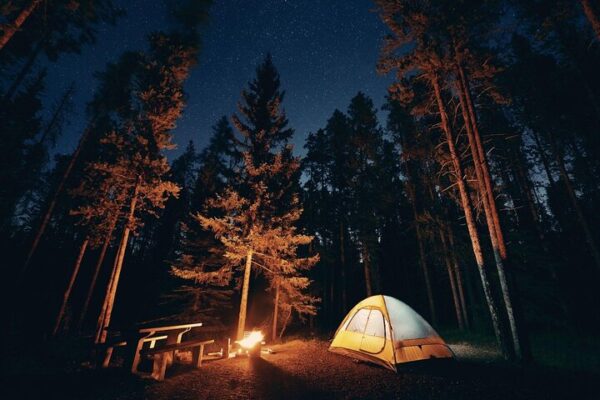
Joining military housing is an option.
Military housing can be a great option for families tan excellent looking for a place to live and want to live in a good neighborhood.
If you plan on joining the military and having children, you may take advantage of military housing options.
This is often cheaper than renting a home alone or even staying at hotels when traveling with kids.
Good Read:How to become a travel agent working from home

Live like a local by picking out couch-surfing options.
Couch surfing is a great way to travel for free. You’ll stay with a local family or individual, who will often become your tour guide and make sure you have an unforgettable time.
Couch surfing is also a great way to meet people worldwide, so if you’re looking for new friends, this option might be perfect.
To find hosts in your area or elsewhere worldwide, visit CouchSurfing.com.
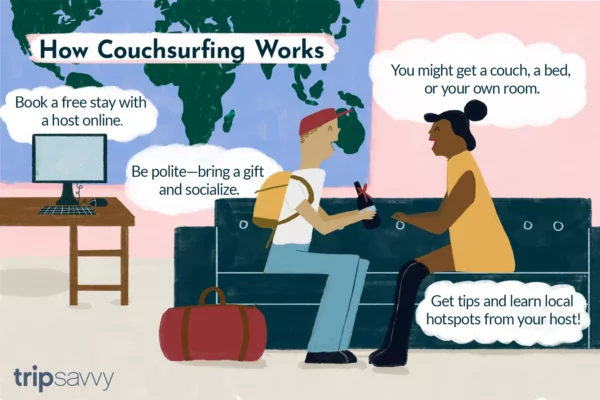
Couchsurfing
Couchsurfing is a network of people who share their homes with other travelers. So you can get a free place to sleep, hang out and meet new friends while you travel. How it works:
- Sign up for the Couchsurfing website.
- Browse hosts’ profiles and see if you’d like to stay with them in their city (or elsewhere). They’ll usually have pictures of themselves, their house or apartment, and details about how many people will stay there and what they’re into doing in their spare time.
- Contact any potential hosts you find interesting through the site’s messaging system. If they say yes, then make plans to meet.

Cheapest hotel booking sites
We’ve done the work for you if you’re looking for the cheapest hotel booking sites
We’ve researched and tested various travel booking sites to find the ones that consistently offer cheap lows. Here’s a list of our recommendations:
– Agoda.com
– HotelsCombined
Need a place to stay for a month for free
Top 5 Best Websites That Let You Stay for Free
- Couchsurfing. The most popular site for free stays is Couchsurfing.
- Be Welcome. A nonprofit with more than 70k members, Be Welcome aims at connecting you with a location click their city, no matter where you go.
- Trust Roots.
- Moto Stays.
- Horizon.
- 10 Comments.
Frequently Asked Questions
What can I do instead of going to a hotel?
Since you’re reading this, you probably already know that a hotel is one of the more expensive vacation options.
There are other choices, though! Before you book a hotel room, think about these alternatives:
Stay with friends and family – there’s no better way to save money on a trip than by staying with relatives or close friends.
If you don’t have friends or family in your destination, consider renting a room on Airbnb (a website where people rent out their apartments and homes).
Rent an apartment – if you’re traveling with a large group of people (or even just two to four), renting an apartment can be cheaper than staying in separate hotel rooms.
You can check out websites like VRBO or Home Away for vacancies.
Camp – get back to nature and pitch a tent at your destination! This is a great way to save money and still have fun if you’re going somewhere in warm weather.
Sleep in your car – okay, so this isn’t exactly glamorous. But this is an option if you’re going somewhere where accommodations are costly (like the Caribbean) or want to spend more time exploring and less worrying about where you’ll sleep.
How can I sleep cheap on a road trip?
When you’re in a new place, it can be hard to get a sense of the proper budget for lodging. So here are some ideas for how to sleep cheaply on a road trip.
Find a trusty campsite that’s close to some local attractions. In our case, we stayed at the campground of a state park near the Inner Harbor.
There were tons of museums, aquariums, and restaurants close by that we could walk from our site at any time of day.
Look for motels or hotels with complimentary breakfast. For example, we stayed at the Hampton Inn in Annapolis, MD, about 10 miles from where we wanted to be.
The room was tiny, but we didn’t mind since it had a microwave and mini fridge (this is a crucial thing to have on a road trip).
They also offered breakfast daily with oatmeal, eggs and sausage, bagels and cream cheese, and cereal.
It was great because we could eat quickly and be on our way without spending too much money.
Choose somewhere with free parking if you’ll be there for more than one night.
You don’t want to pay for parking every day when you might need to leave your car parked there.
How can I live in a hotel for free?
Living in a hotel for free might seem like an impossible dream for many people. But as this article will explain, it’s easier than it sounds and is an achievable goal for many people.
So, how can you live in a hotel for free? The first step is to book the room under your name and never mention that you plan to live there long-term.
It’s important to remember that each hotel has its own rules about residential stays, so it’s essential to play by the laws and never lie or bend them further into your visit; otherwise, you could find yourself out on the street with nowhere to go.
When you check in, make sure that you have everything you need with you. This means having at least one change of clothes and personal hygiene items.
Also, bring any supplies you’ll need if you need a few days to find a job or get settled in before moving out into your place, then bring enough food supplies to last you that time.
When you first check in, it’s best not to do anything that would draw attention.
If possible, take no phone calls or answer emails from friends and family members.
Are hotels more expensive?
Of course, they are. Hotels typically cater to business travelers, who often feel entitled to value and don’t mind paying for it—not to mention tourists, who are happy to pay extra for the convenience of a room that’s always ready when they get there.
Hotels also offer specific amenities that can be costly to provide, including room service, valet parking (in cities where parking is difficult), laundry service, and Internet access.
On top of all that, hotels have meager overhead costs: they don’t have to maintain or clean their rooms between guests (though most do a pretty good job of it anyway), and they don’t have to train new staff every time someone leaves, and the labor hours per guest are usually meager.
So why aren’t hotels more expensive? Because of competition. Hotels have to compete with each other for guests because there’s no shortage of people willing to pay for their services.
People will go elsewhere if one hotel raises its prices much higher than its competitors. And even if a hotel has some monopoly on its location (such as in a resort area), another hotel will be nearby trying to lure guests away from it.
The result is that hotels tend to offer similar services at similar rates when compared with each other.
Where do people stay when traveling?
The first thing I do when I arrive in a foreign place is find a friendly hotel check-in. I love hotels.
They’re like my second home. I find them relaxing and comforting, and I’d much rather stay in a hotel than any other accommodation.
Hotels are luxurious, particularly where you can have everything you need: a bed, a shower, a television, and complimentary free coffee. And sometimes even free toothbrushes.
They’re very comfortable (as long as you’re not too picky about things like temperature). It’s easy to settle into one place while traveling. After all, hotels are designed to smooth away travel bumps and make you feel at home.
You can also expect consistency; hotels across the globe follow specific standards and practices that make things familiar enough for you to feel comfortable in your surroundings.
The best part is that staying in hotels means you don’t have to worry about transportation or unpacking your bags.
Just walk into the lobby, and everything you need is set up for you. It’s so convenient.
Where is the safest place to sleep in your car?
When you decide to sleep in your car, you want to ensure you’re as safe as possible. You don’t want to be a victim of a crime or cause an accident on the road.
Some say the safest place to sleep in your car is in the backseat, but it’s not. If you put your seat back, there won’t be enough room for the seat belt to take effect if a crash occurs.
Another option is to sleep on the front seat, but this isn’t always a good idea either because if your car flips over during a crash, there is a higher chance that you’ll be thrown from your vehicle.
The safest place to sleep in your car would be the backseat floor. This allows for plenty of legroom and ensures that you’ll be secure and won’t get thrown from your vehicle if something happens.
Summary
When traveling, it’s easy to get caught up in the excitement of new places and begin spending money on things you don’t need. However, there are ways to find cheap places to stay when traveling that won’t break the bank while still providing comfort to rest your head.
You can find budget-friendly hotels in many different ways: through online travel agencies like Expedia or Kayak, by contacting local hotels directly (they may have special deals); or by traveling during off-season or peak tourist times (such painter).
Traveling can be expensive, but many cheap alternatives to traditional hotels exist. So whether you’re looking for a place to rest your head at night or a home base while exploring a new city, there are plenty of options for those who want to save money when traveling.




